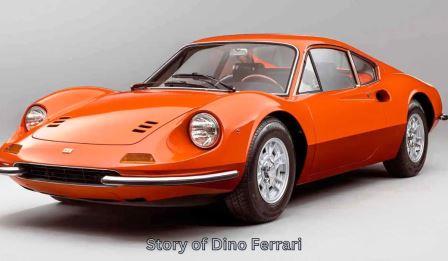The name Ferrari evokes images of sleek, powerful sports cars, a symbol of Italian automotive excellence. But nestled within Ferrari’s rich history lies a lesser-known chapter – the era of the “Dino Ferrari.” These mid-engined sports cars, produced from the late 1960s to the mid-1970s, hold a unique place in Ferrari’s legacy, offering a captivating story of innovation, passion, and a touch of tragedy.
A Legacy Etched in Steel: The Birth of the Dino Ferrari
The story of the Dino Ferrari begins not with Enzo Ferrari, the company’s founder, but with his son, Alfredo “Dino” Ferrari. A brilliant young engineer with a passion for motorsport, Dino tragically passed away from Duchenne muscular dystrophy at the young age of 24. To honor his son’s memory, Enzo embarked on a project that defied Ferrari tradition – the creation of a new line of mid-engined sports cars.
A Departure from Tradition: The Allure of the Mid-Engine Design
Up until this point, Ferrari had focused on front-engined, V12 grand tourers. The “Dino Ferrari” represented a radical departure from this established formula. These new cars, christened “Dino” in tribute to Enzo’s son, embraced the mid-engine layout, a configuration known for superior weight distribution and handling prowess. This shift towards mid-engined design reflected the growing influence of motorsport technology on road cars, and the “Dino Ferrari” became a pioneer in this emerging trend.
The Allure of the Dino Ferrari: Beauty, Performance, and Exclusivity
The “Dino Ferrari” wasn’t just about technical innovation; it also possessed undeniable aesthetic appeal. Sleek, curvaceous designs by Pininfarina adorned the chassis, creating timeless automotive sculptures. These cars were not just about raw power – they offered a more balanced driving experience, perfect for the discerning sports car enthusiast. Models like the Dino 206 GT and the Dino 246 GT/GTS showcased Ferrari’s engineering prowess wrapped in a captivating design language.
However, the “Dino Ferrari” also carried a distinct identity, separate from the traditional Ferrari lineup. Notably, these cars were equipped with smaller V6 engines, a further departure from the V12 norm. This distinction was reflected in their pricing, making them more accessible to a wider range of buyers compared to the flagship Ferraris.
A Short-Lived Legacy: The End of the Dino Era
The “Dino Ferrari” era proved to be a relatively short-lived chapter in Ferrari’s history. Production ceased in the mid-1970s. There are several theories surrounding the demise of the Dino line. Some suggest Enzo Ferrari’s own reservations about the “Dino” brand, while others point to the increasing popularity of larger-engined sports cars.
The Enduring Legacy of the Dino Ferrari
Despite its brief tenure, the “Dino Ferrari” left a lasting impact on the automotive world. It showcased Ferrari’s willingness to innovate and explore new avenues in car design. The “Dino” badge became synonymous with beautiful, driver-focused sports cars. Today, these cars remain highly sought-after collectibles, cherished by enthusiasts for their unique character and historical significance.
The “Dino Ferrari” story serves as a reminder of the power of passion and the enduring impact of innovation. These automobiles represent a captivating chapter in Ferrari’s history, forever linked to the legacy of a son whose love for the marque would leave an indelible mark on the Prancing Horse.
See also-Black Ops 6 Confirmed: A New Chapter in the Call of Duty Saga
